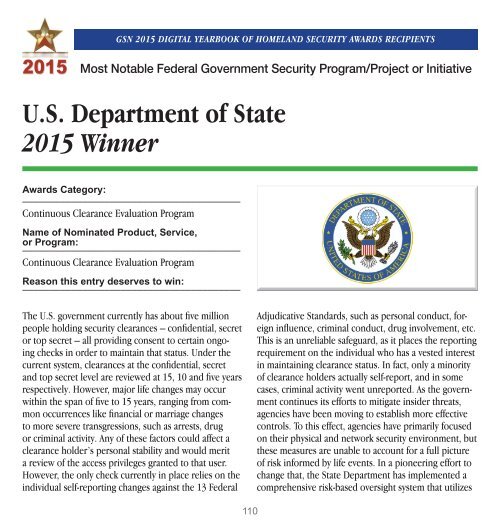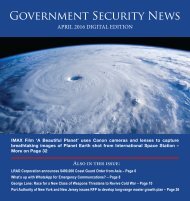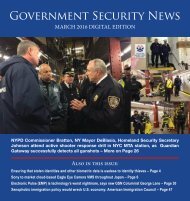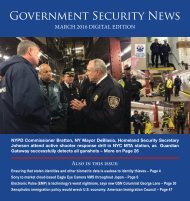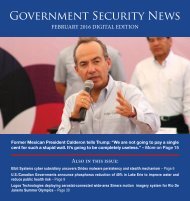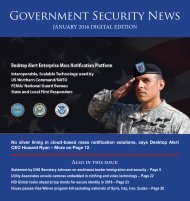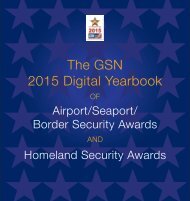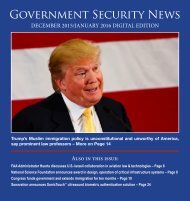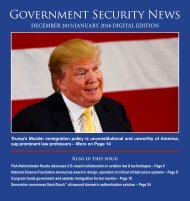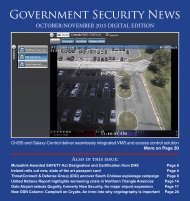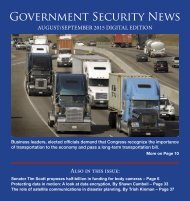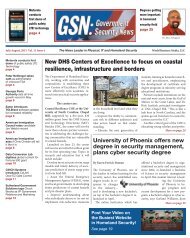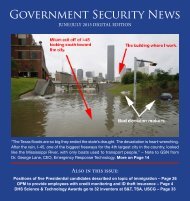The GSN 2015 Digital Yearbook of Awards
You also want an ePaper? Increase the reach of your titles
YUMPU automatically turns print PDFs into web optimized ePapers that Google loves.
<strong>GSN</strong> <strong>2015</strong> DIGITAL YEARBOOK OF HOMELAND SECURITY AWARDS RECIPIENTS<br />
Most Notable Federal Government Security Program/Project or Initiative<br />
U.S. Department <strong>of</strong> State<br />
<strong>2015</strong> Winner<br />
<strong>Awards</strong> Category:<br />
––––––––––––––––––––––––––––––––––––––––<br />
Continuous Clearance Evaluation Program<br />
Name <strong>of</strong> Nominated Product, Service,<br />
or Program:<br />
––––––––––––––––––––––––––––––––––––––––<br />
Continuous Clearance Evaluation Program<br />
Reason this entry deserves to win:<br />
––––––––––––––––––––––––––––––––––––––––<br />
<strong>The</strong> U.S. government currently has about five million<br />
people holding security clearances – confidential, secret<br />
or top secret – all providing consent to certain ongoing<br />
checks in order to maintain that status. Under the<br />
current system, clearances at the confidential, secret<br />
and top secret level are reviewed at 15, 10 and five years<br />
respectively. However, major life changes may occur<br />
within the span <strong>of</strong> five to 15 years, ranging from common<br />
occurrences like financial or marriage changes<br />
to more severe transgressions, such as arrests, drug<br />
or criminal activity. Any <strong>of</strong> these factors could affect a<br />
clearance holder’s personal stability and would merit<br />
a review <strong>of</strong> the access privileges granted to that user.<br />
However, the only check currently in place relies on the<br />
individual self-reporting changes against the 13 Federal<br />
Adjudicative Standards, such as personal conduct, foreign<br />
influence, criminal conduct, drug involvement, etc.<br />
This is an unreliable safeguard, as it places the reporting<br />
requirement on the individual who has a vested interest<br />
in maintaining clearance status. In fact, only a minority<br />
<strong>of</strong> clearance holders actually self-report, and in some<br />
cases, criminal activity went unreported. As the government<br />
continues its efforts to mitigate insider threats,<br />
agencies have been moving to establish more effective<br />
controls. To this effect, agencies have primarily focused<br />
on their physical and network security environment, but<br />
these measures are unable to account for a full picture<br />
<strong>of</strong> risk informed by life events. In a pioneering effort to<br />
change that, the State Department has implemented a<br />
comprehensive risk-based oversight system that utilizes<br />
110


